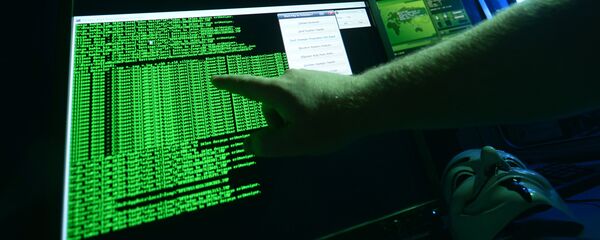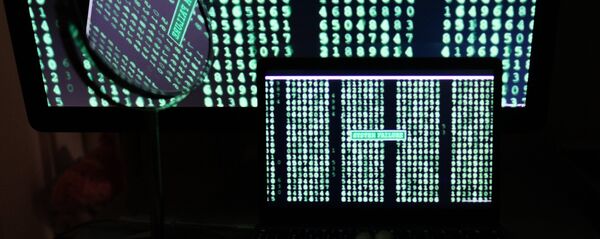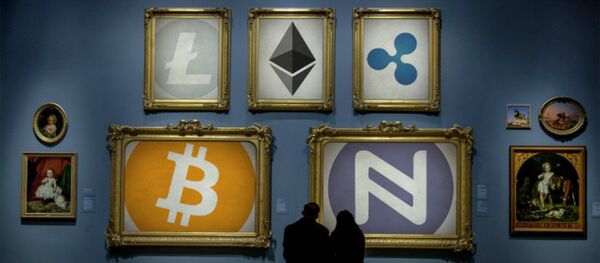Sputnik has spoken to Ben Segal, the developer of the internet computer network at CERN and one of the mentors of Tim Berners-Lee to find out whether the people beind the world web and the internet regret their invention, who paid for the first intercontinental computer network, can the internet be completely turned off around the world and why black swans today determine the development of information technology.
Sputnik: Can you please tell me how the whole idea of creating the internet, the whole network came about?
Ben Segal: Let me say first of all CERN did not invent the internet. The internet existed 20 years before the web. No, it wasn't really military they got money from APA, later DARPA, Air Force Research Project Agency, but it was just seed money, it was not a military project. Part of the idea was to make a network that could survive attack that could survive being broken.
That's true and that's still true. So this work started in 1969 and by the early 80's it was starting to get quite big, but Europe didn't want the internet. I don't know if you know this story.
The Europeans didn't like this technology, it was American, they couldn't control it. It was actually developed in universities by graduate students. It was what we call a bottom-up development, whereas the European and so-called international project to make international communication protocols was a very bureaucratic, top-down, and it never worked, it was never finished.
READ MORE: Physics May Be Sexy But Sexist Physicists Are Not: Prof Fired From CERN
So the internet, in the very beginning of the '80s, very few people knew about it even in research institutes and in Europe it was not wanted. It was actually forbidden.
I lived for 10 years in the US when I was young when I came to CERN I'd been nine years in the States and after six years at CERN starting in 1971 I went back for a year. My wife at that time she was in love with California and she wanted to go back to California and so went back for a year and we soon decided that working wasn't the same as being a student there.
So we came back to CERN. Anyway, I was quite open to American technology, but CERN wasn't. In fact, to buy American hardware like they bought IBM machines they couldn't buy them from the US. It had to be done through Ireland, IBM, of course, was an international company and they made machines everywhere and so CERN could buy it from Europe.
Sputnik: Have you tried it in the United States?
Ben Segal: Yes, my sabbatical year when I went back for a year [to the US] I had seen it and I actually used it to communicate with a friend of mine in CERN. So we could actually send each other emails, and that was actually why when I came back I got a very good project because of that link. So I knew about it, but I didn't know in detail about the protocols and so on which were changing anyway.
I came back to CERN in 1978 and worked on a satellite project to distribute the data of CERN by satellite in Europe and that lasted for five years. In 1983 I was free and I got a new boss and this guy he was interested in what we used to call distributed computing. At the time, you have only been mainframes IBM, Control data was another big company, it was all like that very few networks of any sort.
READ MORE: Chinese Hackers Targeted US Universities for Maritime Military Secrets — Report
However, my new boss had been the head of software development in the IT department but he was hooked on the idea of distributed computing so he stepped down from being a group leader and he took me and one other guy, who happens to be the department head of IT today in CERN, a young programmer at that time, and the three of us started a little operation called Distributed Computing Section.
One of the first things that I wanted to do was test these Internet protocols called TCP/IP and he let me do that. In fact, I tested them against another set of protocols developed by a company called Xerox network protocols. They were actually very good, more elegant than the TCP/IP, but you couldn't find them anywhere, they weren't widely available.
So what we were looking for is a system that we could connect different types of computers in CERN because they couldn't speak to each other. So we did some tests and we decided we would use TCP/IP and we immediately found ourselves in conflict with the main networking people, who weren't so many in CERN, but they had the power money.
So within CERN, I was allowed to install this stuff and we did, in fact, connect all the machines the big machines, the medium machines, the PCs with this stuff and that lasted five years between 84 and 88. We did this alone in the software group, and the main networking people wouldn't talk to us. They wouldn't help us, they didn't want this, they were frightened.
And the management of CERN didn't understand any of the stuff. CERN was not a place to do either computer research actually or certainly not networking and the top management was frightened that CERN would be criticised. We were supposed to buy solutions, buy IBM, not create. Our mission was to do research in physics.
So there was often this tension between the physicists who were the masters and the computer people who were not slaves, but we were staff. So that was the situation.
READ MORE: FBI Sting Hits N Korea Software That Secretly Links Vulnerable PCs for Hacking
Sputnik: How did you explain to them that it was going to be very convenient to have a network?
Ben Segal: Yes, we were allowed to connect inside the lab, but I had to sign the paper that I would not connect with these cancerous protocols outside the lab.
Sputnik: Where they afraid of information leaks?
Ben Segal: At that time we had big monopolies in Europe called PTT — Postal, Telegraph, Telephone — big monopolies. You bought a telephone you couldn't attach anything to it. You had to pay a standard price, and you could not run these protocols over their lines in theory because they had no way to check actually. But there was a big political issue about this.
By the end of 1988 the people developing what was called ISO protocols they gave up on us. All the powerful network people in CERN who had all the money, they realised it was not going to work. They had this political line but it wasn't going work and the stuff that we were connecting it was working. So they switched. And then, of course, it was a big success. So some of these people tried to take credit, but that's another issue.
Sputnik: So first you connected to the United States?
Ben Segal: Yes, in fact, the first line and that was one of the things which persuaded the management to switch, was IBM offered to pay the first line to the US which was at the revolutionary speed of 1 1/2 Mb per second, not gigabytes, megabits per second and that line cost probably 1 or 2 million francs a year, and that was a big deal. IBM paid for three years for that and the politicians started to change.
So the internet was still not visible to the public, it was researched institutions that were using it. But then there was this young man in CERN who I happen to know and happen to have taught him some network programming. He was working on an official project using principles and software that we had been interested in and at the beginning of his project he would come and talk to us and for advice and so on. This was probably 1986-87 and I noticed this guy, there were lots of smart young people in CERN and still are, but he was very enthusiastic and very nice.
READ MORE: Russia Registered 3Mln Cyberattacks Launched From US Territory
He would come and ask interesting questions and he started to talk about this hypertext idea that he got and that didn't mean anything particular to me. Hypertext existed already in Macintosh and in digital equipment system in VMS they had the help facility. You could click on links you were reading and it would take you to the other page but always within one computer. So he had this brilliant idea why not be able to jump to different computers across the network, which were now emerging.
It was a great idea in theory, but to do that was almost impossible. It certainly seemed to me it was going to be impossible, to connect a different machine all the data is in a different format and the bites are the wrong way around. So it was a pretty idea on paper but to do it seemed impossible, but he did it.
Sputnik: What was his name?
Ben Segal: It was Tim Berners-Lee. It makes me emotional today.
Sputnik: It was just him?
Ben Segal: One guy. And it was a hobby, it was not ordered. It was not in a programme. On the contrary when it started to emerge the management was worried again that they would be caught: "You've been putting money into computing, you're not allowed, we'll cut your budget". That was the attitude. They also didn't really trust stuff coming out of the computer.
Sputnik: But you trusted the guy and you started working with him?
So is working on that, but I knew him. I was a friend if you like and I encouraged what he was doing and I knew his boss. His boss, another Englishman who let him do this in his spare time, didn't stop him. Some bosses would've said, "No, this is a rubbish idea, don't waste your time". And the fact that it was going to be so difficult to do.
I think it was a set of coincidences, unlikely coincidences that this guy was here, that he had this dream, and he had the ability to implement this. This is most unusual. You can have dreamers but they're not good programmers, and if they are they write a programme and they forget about it. And this guy had this drive, and he still has that. Now, of course, he's a bit disillusioned, like many of us, with what's happened to the web; because we connected the world, it was our dream…
Sputnik: Yeah, the idea you had was to connect people…
Ben Segal: We thought politically, information is the power we thought this was going to be a democratic influence. It is in a way, but now we can see that it can be bad as well. I don't like to say it we connected everything but we connected the shit as well. And it's very hard to control. The whole human psyche is connected on the internet.
READ MORE: Russian Home-Grown Computer Poised to Ease Dependence on Industry Heavyweights
Sputnik: But you never know, you got those people who created a powder, they created it for fireworks, not for guns…
Ben Segal: But to begin with, I used to go around the world teaching this stuff and see countries that had no information and they could get it and it was great. Now everybody's got it and it is good and it is bad.
Anyway, he still has a vision. He's working hard on a system it's called SOLID. Where you can have ownership of your data and you have much more control, but it's a bit late. A lot of the pioneers we wonder did it have to turn out like that. I still think it was a good thing and I would do it again.
Sputnik: So wasn't a mistake to open Pandora's Box and give people the Internet?
So the first project I had at CERN was to make little systems, there were 12, around the site where you could go with your cards and go back later to get your paper it was still the same principle but you didn't have to go to the computer centre. You could go to the nearest one, and if you were at a big part of the site there would be one near you. And that was the first networking project that I did.
I got into networking completely by accident, just by chance. And right away I was in political trouble with somebody, because if the central computers stopped working or anything went wrong then these remote stations wouldn't work. And the users, the physicists, I'm a physicist by the way. They would say, "This is rubbish your system, what's happening".
READ MORE: Cryptocurrency Fundraiser by Hamas Shut Down by US Online Exchange
And often the case was that at the centre they would stop the computer to do service or whatever, but there was no way to tell to the people out there. So I proposed that there be a camera put in the centre looking at the machines and they could write on a blackboard system time. And I got in all sorts of trouble for proposing that because the head of the operations said, "You want to spy on us. We will put cameras to look at what the remote people are doing, but you can't have a camera". So this was straight away political, whereas I was more interested in bits and bytes.
But straightaway it was a political issue connecting computers. And then when we started to fight about the protocols there was a lot of politics and bad feeling. It was a very unpleasant time.
So anyway, make sure that you separate the internet itself which has its own problems and the web. What the web did was make the internet accessible to the public because it was a reasonably simple interface and it's got more and more now.
Sputnik: What was your first feeling when you saw the World Wide Web for the first time?
Ben Segal: I remember it very well. I saw when he received the machine on which he did the prototype. I helped him buy the machine. I went with him to his boss to help persuade his boss to let him have one because that machine was also not legal in CERN, it was American, we call it NeXT computer. When Steve Jobs who started Apple Macintosh he had a row and he left his own company and he started a new company.
It was called the NeXTcube computer and it was the most beautiful thing, physically beautiful hardware, black cube, but technically the software was fabulous, and it was a perfect platform to do this development on, and Tim had seen it and he knew but you couldn't buy them in CERN officially, but I knew an Italian guy who'd bought them already in some way, and I went and talked to him and he would be willing to get another.
Sputnik: All by himself?
Ben Segal: Yes, all by himself, just having the idea is not enough. We say in English the devil is in the details. So that was why what he did was so great.
Sputnik: So he's like the Leonardo da Vinci of our days, the reason why we have the internet, the world wide web…
Ben Segal: Of course, he showed me the machine talking to itself, because there were no websites and he made the first website http://info.cern.ch and you can still reach that site, it's been dressed up to look a little bit like it looked then.
Later what really boosted the web was a development in the US. Let me go back a bit. So he had this thing and he showed the prototype and people didn't understand, even he didn't understand how far it was going to go, but at that point it was running on this Next machine of which there were two or three in CERN and there were not many in the world because Steve Jobs didn't manage to sell very many of these machines.
READ MORE: System Error Makes It Possible to Mine Cryptocurrency Out of Thin Air
But what was needed then was we call a port of the software to the PC that was going to really boost it and then you could port it to other machines as well, and it turned out it was hard to do and he didn't have an experience on the PC and he needed some help and CERN wouldn't give them resources, and he got a couple of students. But he needed to have a small team, but CERN didn't want to take ownership of this because they didn't want criticism.
It wasn't their business which is true. So, in the end, he left, in 1994. He got an offer from MIT and he became a professor there, first professor at MIT without a PhD. He never had time to do a PhD and he's still there and he runs this World Wide Web Consortium, and he still guides the web standards from there with a big team.
In late 1991 or early 92, he put the software out on something called Usenet. It was a system of bulletin boards which existed already among UNIX machines on the internet and he put his software out there.
Sputnik: So there was some network of experts?
Ben Segal: The actual subject they put it out on was hypertext. He put the software in a place where some interested people saw it and people started to port it and the Americans in Illinois ported it to something called Mosaic on the PC. So I remember at that time I had a very beautiful machine on my desktop which was given to me by a company called Silicon Graphics, which was a very successful American company.
The Louvre museum had a beautiful website, you could not walk around the Louvre like today's virtual reality, but you could see what sort of pictures you were interested in, what sort of art and it was just beautiful. So I would say have you seen Mosaic. I wouldn't ask them have you seen the web, have you seen Mosaic, so they almost took credit for it at the American lab. In the end, they didn't.
Sputnik: Had you realised it was Tim's idea?
Ben Segal: Yes, but Mosaic became Netscape and today it's Mozilla. But it was university software, it was Tim's software, it was taken they didn't hide that fact. They rewrote it for the PC.
It was just the implementation which they made it work on PC and on my workstation. They ported it to all important stuff.
Sputnik: So what were your feelings when you first saw it, what was it like, have you realised what's going to happen next?
Ben Segal: Yes, I could see. My wife, who is anti-computing and she was all excited about it. So yeah. You could see it was unstoppable and then it made the internet takeoff.
Internet had been there for 20 years, sort of sleeping, very technical and with this by 1991, not me personally, but some people I knew started something called the Internet Society. And in 1995 I and some friends started a Chapter of the Internet Society in Geneva which grew to be the biggest chapter in the world. We had some 250 members in 1995, now it doesn't exist anymore, but it was a huge interest in a place like Geneva which is not Silicon Valley. But it's got international organisations, and that was definitely triggered by the web, not by the internet.
READ MORE: China Launches Prototype Supercomputer, Aiming to Beat World's Fastest One
It needed the internet, but it was like a turbo charge for the internet and then everybody started talking about the internet and finally, it appeared on smartphones. So there's more internet access now from smartphones than anything else.
So the essential point is it was one guy with very unusual capabilities.
Sputnik: But still you helped him with your advice…
Ben Segal: A bit. I was proud that he has more than once said that I am one of his mentors which is true, but it wouldn't have happened without this guy. It wasn't CERN. Some of the things happening at CERN were good for him; the fact that we just opened the internet and I was there to explain how he should programme it and so on. But all the essential work was his own, his ideas, it was his own confidence.
Ben Segal: I've always refused to answer questions like that. Technical questions also, because were at an exponential development speed. When I started here at CERN the generation of technology was about five years and now it's six months or a year. So it's harder and harder. So if I could try and predict the future in 1971 it was sort of feasible, but now it's not. Nobody can foresee.
Have you read a book called the "Black Swan" (Nassim Nicholas Taleb)? The Web was a black swan, so was Google and Facebook, nobody could foresee that. When I saw Google for the first time, I said it can't be true, it can't work. I had no idea how they did it, and they were indexing the whole time. That's how it works, but that's a marvellous idea. That's an incredible idea a Russian guy, of course, did that but. […]
Nobody could predict when I was working and teaching the internet around the world that 99% of the email would be spam, it would need to be filtered. We had no idea, maybe you could think 10 percent.
READ MORE: Killer Robots Not Mentioned in Pentagon's Latest AI Strategy
So it's very hard, I can't answer what's going to be the next black swan, you know the general trend. I always used to be an optimist in my life but now maybe I'm getting too old. I'm fairly pessimistic about the human condition in general. To me actually, it's a miracle that I wake up in the morning and I don't read in the paper that a ship in New York harbour has exploded a nuclear device or some terrorist thing. It can just happen anytime, that's being a pessimist. I sort of read the paper to find out hopefully that it's not happened, I never used to be like that. […]
There's something called cyber warfare. I think cyber warfare is very dangerous.
Sputnik: Do you think you can harness the power of the internet and the spread of information for good?
Ben Segal: Yes, I do. I think that a solution possible if there's going to be a solution is going to be done with open source approach where you can have thousands of brains around the world you can find bugs that generate the trouble. There are many smart people but they are also, unfortunately, many evil people who are also smart and this is a problem that we don't seem to be able to deal with.
So just talking then about informatics and internet because we are also on this exponential speed that we don't have much time to fix things. I'm not very optimistic that a hundred years from now that the world is not going to be destroyed. I mean there are so many things that can go wrong.
READ MORE: AI Might Actually Become Mankind's Doom, WARNS Digital Strategy Consultant
Sputnik: Is it possible to switch off the internet, like totally?
Ben Segal: Russia is about to do an experiment where they cut themselves off from the main routers in the world. None of the main routers is in Russia, most of them are in the US. So there's an experiment going on right now. In a few days, they're going to activate their own routing system, so that if the American routing was cut off for one reason or another they could still have internet in Russia.
Internet was designed to have redundant connections so it's hard to kill off the internet, but you could. Now a really big problem would be a space explosion which messes up a lot of electronics and power transmissions things like this are certainly possible and well understood.
Sputnik: Space explosions meaning what?
So, yes, it is and of course, the ultimate way to switch off the internet is to switch of humanity with a series of nuclear exchanges which could happen by accident. A few hundred bombs exchange would solve all problems. And we live in a time where even though they have reduced over the last 20 years or so we still got thousands. […]
So yes, it's possible, but without destroying the world is it possible? It's hard because there is a lot of redundancy. So as long as there is a radio signal, cables, laser or whatever you can communicate with those protocols. So it would be hard to switch it off completely, but, of course, you could do a lot of damage. A few years ago I thought it was impossible for a country to filter effectively internet, but it is possible. The Chinese have successfully done it, the Russians have done it. A few clever people can get around it. Basically the Chinese don't have Google but they have something on their own.
READ MORE: SM Mining Data for Facial Recognition AI: Submit Button Means Surrender — Author
Sputnik: What's your assessment of Russian scientist and Russian mathematicians in the fields of internet, how do you assess their work?
Ben Segal: As you know Google was started by a Russian man Sergei Brin. I have the very highest admiration for Russian mathematicians, the whole tradition of Russian education in mathematics and science, very high. On the internet, they were slow getting into it because of political reasons, but Russian mathematicians, like Russian musicians, are the best.
Sputnik: So you think there will be a black swan from the Russian side?
Ben Segal: That's a great idea. I feel the Chinese got one, it's the Chinese century and they amaze me how they might have an oppressive system and they may be having like a George Orwell system of giving likes and dislikes and so on; but it's not so long ago that people would say that Chinese just copy and steal and it's not true anymore. I mean it's made in China.











